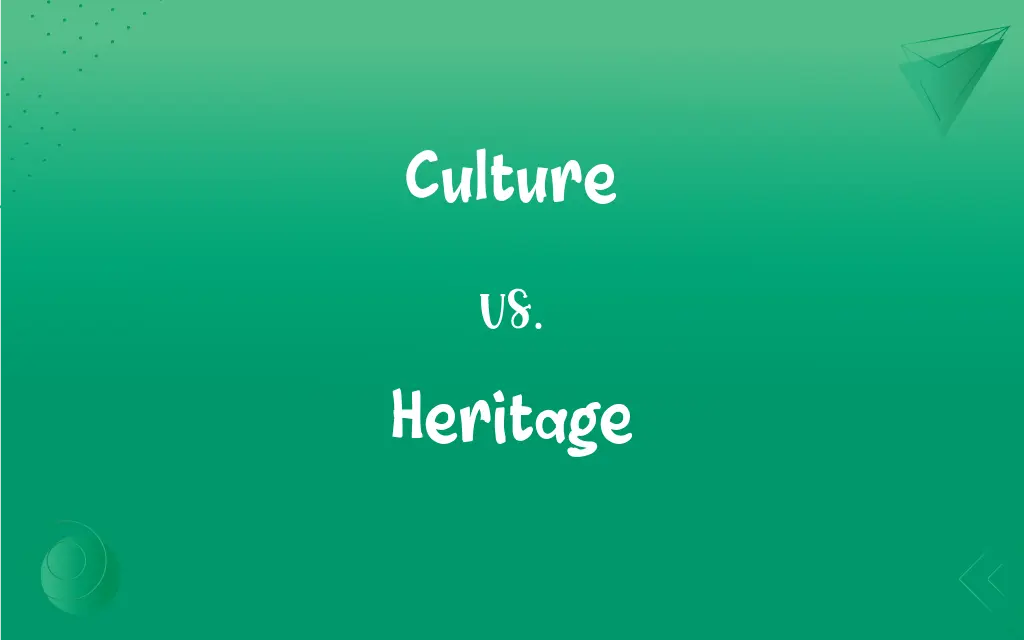Culture vs. Heritage: What's the Difference?
Edited by Aimie Carlson || By Janet White || Published on October 11, 2023
Culture refers to the shared beliefs, practices, and social norms of a group or community. Heritage is the legacy of physical artifacts and intangible attributes inherited from past generations.

Key Differences
Culture and Heritage are two interrelated but distinct terms. Culture refers to the complex system of shared beliefs, values, customs, and behaviors that define a group or community. This includes language, religion, art, and social norms. Heritage, on the other hand, is a broader term that encompasses both tangible and intangible assets passed down from previous generations, including traditions, landmarks, and historical artifacts.
Culture is dynamic and evolving, influenced by various factors like technology, migration, and social change. It is about how people live their lives, including how they express themselves and how they view the world around them. Heritage is more static, representing a fixed legacy that is preserved and passed down through generations. While culture can change relatively quickly, heritage is about preserving and respecting the past.
In terms of language and grammar, "culture" is predominantly used as a noun but can also be used as a verb (to culture bacteria in a lab, for example). "Heritage," on the other hand, is mainly used as a noun and is often preceded by possessive pronouns like "our" or "your." Culture frequently appears in both formal and informal contexts, whereas Heritage is often used in formal or historical contexts.
To sum it up, culture is about the present ways of life and shared values among a group, while heritage is the tapestry of the past that has been passed down. Culture is a living, evolving entity, whereas heritage is what we inherit and choose to preserve for future generations.
Comparison Chart
Nature
Dynamic, evolving
Static, inherited
ADVERTISEMENT
Elements
Beliefs, practices, norms
Artifacts, traditions, landmarks
Grammar
Used as both a noun and a verb
Primarily used as a noun
Context
Both formal and informal
Often formal or historical
Time Orientation
Present-focused
Past-focused
Culture and Heritage Definitions
Culture
The artistic and intellectual achievements of a society.
Renaissance culture had a deep impact on Western thought.
ADVERTISEMENT
Heritage
Traditions and practices passed down through generations.
Family reunions are an important part of her heritage.
Culture
The lifestyle and choices prevalent among a population.
Fast-food culture has spread globally.
Heritage
Historic sites and landmarks.
The Great Wall is a significant part of Chinese heritage.
Culture
The arts, beliefs, customs, institutions, and other products of human work and thought considered as a unit, especially with regard to a particular time or social group
Edwardian culture.
Japanese culture.
Heritage
Inherited characteristics or features.
Language is a key aspect of cultural heritage.
Culture
These arts, beliefs, and other products considered with respect to a particular subject or mode of expression
Musical culture.
Oral culture.
Heritage
The body of works in art, music, and literature that are considered valuable.
Shakespeare's plays are part of English heritage.
Culture
The set of predominating attitudes and behavior that characterize a group or organization
A manager who changed the corporate culture.
Heritage
The legacy of physical and intangible assets from the past.
National parks are part of America's natural heritage.
Culture
Mental refinement and sophisticated taste resulting from the appreciation of the arts and sciences
A woman of great culture.
Heritage
Property that is or can be inherited; an inheritance.
Culture
Special training and development
Voice culture for singers and actors.
Heritage
Something that is passed down from preceding generations; a tradition.
Culture
The cultivation of soil; tillage
The culture of the soil.
Heritage
The status acquired by a person through birth; a birthright
A heritage of affluence and social position.
Culture
The breeding or cultivation of animals or plants for food, the improvement of stock, or other purposes.
Heritage
A domesticated animal or a crop of a traditional breed, usually not widely produced for commercial purposes.
Culture
The growing of microorganisms, tissue cells, or other living matter in a specially prepared nutrient medium.
Heritage
An inheritance; property that may be inherited.
Culture
Such a growth or colony, as of bacteria.
Heritage
A tradition; a practice or set of values that is passed down from preceding generations through families or through institutional memory.
Culture
To cultivate (soil or plants).
Heritage
A birthright; the status acquired by birth, especially of but not exclusive to the firstborn.
Culture
To grow (microorganisms or other living matter) in a specially prepared nutrient medium.
Heritage
(attributive) Having a certain background, such as growing up with a second language.
A heritage speaker; a heritage language
The university requires heritage Spanish students to enroll in a specially designed Spanish program not available to non-heritage students.
Culture
To use (a substance) as a medium for culture
Culture milk.
Heritage
That which is inherited, or passes from heir to heir; inheritance.
Part of my heritage,Which my dead father did bequeath to me.
Culture
The arts, customs, lifestyles, background, and habits that characterize humankind, or a particular society or nation.
Heritage
A possession; the Israelites, as God's chosen people; also, a flock under pastoral charge.
Culture
The beliefs, values, behaviour and material objects that constitute a people's way of life.
Heritage
Practices that are handed down from the past by tradition;
A heritage of freedom
Culture
The conventional conducts and ideologies of a community; the system comprising the accepted norms and values of a society.
Heritage
Any attribute or immaterial possession that is inherited from ancestors;
My only inheritance was my mother's blessing
The world's heritage of knowledge
Culture
(anthropology) Any knowledge passed from one generation to the next, not necessarily with respect to human beings.
Heritage
That which is inherited; a title or property or estate that passes by law to the heir on the death of the owner
Culture
(botany) Cultivation.
Heritage
Hereditary succession to a title or an office or property
Culture
(microbiology) The process of growing a bacterial or other biological entity in an artificial medium.
Culture
The growth thus produced.
I'm headed to the lab to make sure my cell culture hasn't died.
Culture
A group of bacteria.
Culture
(cartography) The details on a map that do not represent natural features of the area delineated, such as names and the symbols for towns, roads, meridians, and parallels.
Culture
(archaeology) A recurring assemblage of artifacts from a specific time and place that may constitute the material culture remains of a particular past human society.
Culture
(euphemism) Ethnicity, race (and its associated arts, customs, etc.)
Culture
(transitive) to maintain in an environment suitable for growth especially of bacteria cultivate}}
Culture
(transitive) to increase the artistic or scientific interest in something cultivate}}
Culture
The act or practice of cultivating, or of preparing the earth for seed and raising crops by tillage; as, the culture of the soil.
Culture
The act of, or any labor or means employed for, training, disciplining, or refining the moral and intellectual nature of man; as, the culture of the mind.
If vain our toilWe ought to blame the culture, not the soil.
Culture
The state of being cultivated; result of cultivation; physical improvement; enlightenment and discipline acquired by mental and moral training; civilization; refinement in manners and taste.
What the Greeks expressed by their paidei`a, the Romans by their humanitas, we less happily try to express by the more artificial word culture.
The list of all the items of the general life of a people represents that whole which we call its culture.
Culture
The cultivation of bacteria or other organisms (such as fungi or eukaryotic cells from mulitcellular organisms) in artificial media or under artificial conditions.
Culture
Those details of a map, collectively, which do not represent natural features of the area delineated, as names and the symbols for towns, roads, houses, bridges, meridians, and parallels.
Culture
To cultivate; to educate.
They came . . . into places well inhabited and cultured.
Culture
A particular society at a particular time and place;
Early Mayan civilization
Culture
The tastes in art and manners that are favored by a social group
Culture
All the knowledge and values shared by a society
Culture
(biology) the growing of microorganisms in a nutrient medium (such as gelatin or agar);
The culture of cells in a Petri dish
Culture
(bacteriology) the product of cultivating micro-organisms in a nutrient medium
Culture
A highly developed state of perfection; having a flawless or impeccable quality;
They performed with great polish
I admired the exquisite refinement of his prose
Almost an inspiration which gives to all work that finish which is almost art
Culture
The attitudes and behavior that are characteristic of a particular social group or organization;
The developing drug culture
The reason that the agency is doomed to inaction has something to do with the FBI culture
Culture
The raising of plants or animals;
The culture of oysters
Culture
The shared beliefs and practices of a community.
American culture values individualism.
Culture
The sum of social norms and interactions within a group.
Corporate culture can influence employee satisfaction.
Culture
A system of shared meanings that differentiate one group from another.
Indigenous culture is rich in folklore and tradition.
FAQs
Can Culture change over time?
Yes, culture is evolving and can change over time.
Is Heritage only about history?
While often historical, heritage can also include more recent legacies.
How is Heritage preserved?
Through museums, archives, and cultural preservation laws.
What is Culture?
Culture is the set of shared beliefs, practices, and social norms of a group.
Is Heritage always fixed?
Heritage is generally static and aims to preserve the past.
What is Heritage?
Heritage is the legacy of assets, both tangible and intangible, inherited from the past.
How do Culture and Heritage differ?
Culture is dynamic and present-focused, while Heritage is static and past-focused.
What are examples of Culture?
Language, religion, and social norms are examples.
What are examples of Heritage?
Historic landmarks, traditions, and artifacts are examples.
Is Culture only about ethnicity?
No, culture can also be about professional, regional, or social groups.
Is Culture the same worldwide?
No, it varies by region, community, and even individuals within those groups.
Can I have multiple Heritages?
Yes, many people identify with multiple heritages.
How is Culture expressed?
Through language, art, rituals, and social practices.
Do Culture and Heritage overlap?
Yes, elements of culture can become heritage over time.
Why are both Culture and Heritage important?
Culture shapes our identity and interactions, while Heritage connects us to our history and origins.
About Author
Written by
Janet WhiteJanet White has been an esteemed writer and blogger for Difference Wiki. Holding a Master's degree in Science and Medical Journalism from the prestigious Boston University, she has consistently demonstrated her expertise and passion for her field. When she's not immersed in her work, Janet relishes her time exercising, delving into a good book, and cherishing moments with friends and family.
Edited by
Aimie CarlsonAimie Carlson, holding a master's degree in English literature, is a fervent English language enthusiast. She lends her writing talents to Difference Wiki, a prominent website that specializes in comparisons, offering readers insightful analyses that both captivate and inform.








































































